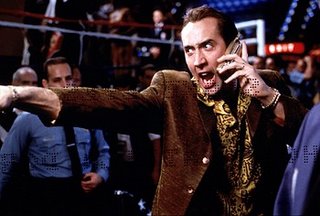
Meghan O'Rourke makes an interesting case for Brett Easton Ellis and his body of work, but I doubt I'll read his newest novel, Lunar Park. Her defense, appearing in Slate, advances a smart and elegant defense made for Ellis and his fellow ‘80’s “Brat Packers” Jay McInerney, Mary Gaitskill, and Tama Janowitz, most tellingly in the collection Shopping in Space: Essays on America's Blank Generation edited by Elizabeth Young and Graham Caveney.British critics all, these American Studies specialists made the case that this “Blank Generation” set of then-young novelists were the most telling and single most important development of the Novel In English, forming a kind of permanent “High Postmodernist” tone through which fiction will give the lie to horrible flatness that is the truth when consumerism irrevocably replaces culture.
A grim determinist view, yes, estimating that inner life is no more than a vaguely self aware mirror that desperately wants to conform to the sheer appearance of beauty and lean design as it’s conveyed by cruel corporations and their marketing departments. It was the perfect line of defense to have in a decade where deconstruction and simulacra were prime subjects in every pedant’s droning mantra. O’Rourke reinvigorates the argument made then as a means of defending Ellis and his new book, and it’s admirable that she nearly had me convinced. What sinks the whole enterprise, however, is an unspoken insistence that graphic and precise descriptions and expositions of what shallow, drooling Pavlov dogs we can be do not suffice as literary art, an art that I would insist get inside situations and personalities rather than hover in godly fashion over the mess. It’s the difference between being in a traffic helicopter over the freeway and actually being behind the wheel, in the midst of it all.
The problem with making a case for a writer who has been on the outs with mainstream critics is that the plausible case gets passed up altogether and overstatement becomes the rule. Gigantism is one of Ellis's flaws, the mistake that accumulation equals worth, value and importance. Sometimes it works, yet even writers who have written long and brilliant books like Jonathan Franzen with Strong Motion will produce a long and profoundly under-edited dud like The Corrections. Franzen needed an honest and ruthless editor to give him back a blue-penciled manuscript with the instructions to make the novel work. Ellis would have benefited greatly from the same advice.
He has always struck me as someone who could be perfectly fine crime novelist, an edgy combination of James Ellroy and Elmore Leonard, if he weren't so busy gussying up his sensationalist subjects with the window dressing of eviscerated narcissism. Certainly his knowing jibes and dissections of ritual consumerism and attending worship of material accumulation have a spot in an America that is exhausting its credit cards to amass more and more of what they cannot take to heaven, but there are limits to how long a reader can gaze into an abyss, or listen to the limitless chatter of character minds that have lost a soul-giving personality. Crime fiction, a form predicated on supreme measures of reserve and clinical flatness, might have been an ideal medium for the rigor mortised humanity he loves to describe constructing the means of their own destruction. The procedural aspects would have imposed some properly ascribed limits on his story lines, and enabled him to write with greater aim.Mailer is exactly right on this point, which is to say that a novelist, even a satirist, needs to be more than a taker of inventories. American Psycho, after all was said and done with brand names, inane opinions on eighties bands, and hack-and-stab remedies for the extreme cases of ennui, is a rather over packed and hastily scribed effort that Ellis needed to finish to fulfill his contract with his publisher. Style and grace, the measures of comedic timing and the required component for wit to sting deeper , is absent from that book, and was in even sparser supply with Glamorama, a large house of a book with many, many unfurnished rooms.
Elements of Ellroy and Leonard are already present in Ellis's work--Ellroy's amoral universe meets Leonard's penchant for sharp observation and satire. The crime genre would have liberated Ellis from struggling to write through his themes under the crushing burden of art, the biggest drag on his effectiveness as a writer. Not that crime novels cannot be artful, as fans of Ellroy , Leonard, James Burke and Mark Costello can attest; the difference is that these writers are artful, describing a skilled application of craft, and not arty, Ellis’s vice, which conveys pose, pose, pose.
To me, Easton Ellis is a more stylized Hubert Selby Jr. Both are cataloging modes of spiritual deprivation.
An interesting comparison and one worth considering. Both are chroniclers of the ways New York will brutalize your soul and kill it, but I'm inclined to give the nod to Selby over Ellis because Hubert used the arc of tragedy to make the violence and desperations of Last Exit to Brooklyn's arresting. One by one, each fantasy and delusion is smashed. It's not a new trick, but it is hard to do believably, and I admire Selby's ability to delicately use a blatant literary device to achieve his drama. Drama is the word.
And I can't consider Ellis as "more stylized" than Selby. Ellis, in fact, is the more conservative prose writer of the two.
I think of Alain Robbe-Grillet, a French "new novelist" who wanted to strip all elements of convenient psychological convolutions, all tangible human feeling, and instead produce a novel of pure, unsullied description. In many ways, Ellis is a very French writer. Remember the last words in American Psycho: No Exit. The fact that Sartre's famous title appears on a sign introduces another tip of the hat to ideas that have seduced Ellis in college, semiotics.
One of Easton Ellis' favorite writers is Joan Didion, who began Play It As It Lays with the precept of writing " a novel so elliptical and fast that it would be over before you noticed it, a novel so fast that it would scarcely exist on the page at all....white space. Empty space...."
He admires Joan Didion, which is swell, but the reason he doesn't write like her is due to his awareness that cannot do what she is able do with her characters in her supremely crafted deadpan style. There is a humanity lurking around behind the eyes of her men and women, battered, shattered, horribly damaged with consumption, violence, money and drugs, but there are personalities, beautifully realized, that are imperfectly trying to make do in a world they no longer have faith in. This is a large part of what makes Didion compelling and worth the effort. Finding the moral vacuum in any age has never been a problem for novelists, it's what kind of witness you wind up being once you find it. Didion has that perhaps capacity to be curious about the humanity of her characters. It's a demonstration of narrative mastery that Ellis hasn't shown.
Even Mailer, when he finally came upon his real life White Negro in the form of convicted murderer Gary Gilmore (in The Executioner's Song, changed his style of writing, going from the high rhetoric and flighty philosophizing and fashioned instead a terse style in which his normally ubiquitous personality was absent, leaving only a complex and moving story to tell with every amount of craft he could muster and sustain. Mailer changed his music, his style and his thinking about his particular set of ideas through his five plus decades as a professional writer, which has made him someone worth returning to.
She is interested in what people are doing to themselves as they try to change the world, a curiosity that brings her to the front ranks of non-fiction writers as well. Ellis isn't able to write in any other way, and I suspect that he's fine with that limit, although he does wish to expand the few notes he can play into major orchestrations.
He admires Joan Didion, which is swell, but the reason he doesn't write like her is due to his awareness that cannot do what she is able do with her characters in her supremely crafted deadpan style. There is a humanity lurking around behind the eyes of her men and women ( Didion , among her other many virtues, makes you believe in interior lives among her characters that were formerly vital, but are now vitiated), battered, shattered, horribly damaged with consumption, violence, money and drugs, but there are personalities, beautifully realized, imperfectly trying to make do in a world they no longer have faith in. This is a large part of what makes Didion compelling and worth the effort.
She is interested in what people are doing to themselves as they try to change the world, a curiosity that brings her to the front ranks of non-fiction writers as well. Ellis isn't able to write in any other way, and I suspect that he's fine with that limit, although he does wish to expand the few notes he can play into major orchestrations. His longer books like Glamorama don't expand the style, refine the ideas he's already written. His writing is an Americanization of moldy existential poses.
The compression of crime fiction would have helped him turn his short comings into assets--he would've been in good company with the likes of George Pelicanos and Dennis Lehain--but it's too late for that, I suppose. Ellis will continue to bleat through his rusty trumpet. Ellis has very few pieces of music he knows how to play, which leaves him with some depressing choices when he strives to create yet again: play them louder, longer, faster, and after that, play them slower, softer, briefer. It is all the same stuff with hardly new idea or insight, matters we look for if we continue to read the same authors over time. We've seen a growth in Ellis as a writer, but it's tumorous rather than artistic. A writer's work ought to develop, as opposed to metastasizing




















